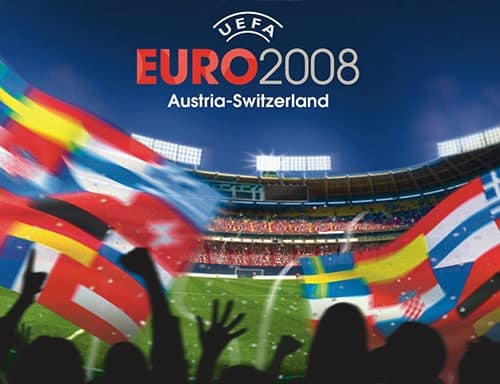
The draw for the finals tournament took place on 2 December 2007, and saw Group C immediately labelled as the "group of death", with Italy, France, Romania and the Netherlands competing for the two qualifying places. England was the only seeded team not to qualify for the tournament proper, whereas Russia was the only unseeded one to qualify. The qualifying tournament was contested by national teams from each of UEFA's member associations, with the exceptions of Austria and Switzerland, who had automatically qualified for the finals tournament as hosts and Montenegro, who came into existence too late to be admitted to UEFA. Qualification for Euro 2008 started in August 2006, just over a month after the end of the 2006 FIFA World Cup. As European champions, Spain earned the right to compete for the 2009 FIFA Confederations Cup in South Africa. Austria and Switzerland automatically qualified as hosts the remaining 14 teams were determined through qualifying matches, which began in August 2006. Throughout 31 matches, the participating nations totalled 77 goals, the same as the previous tournament. They recorded the worst finish in Euro 2008, collecting the least amount of prize money and gaining no points in their three group fixtures. Greece were the defending champions going into the tournament, having won UEFA Euro 2004, the previous competition. Spain were also the first team since Germany in 1996 to win the tournament undefeated. The second jointly hosted finals in the competition's history, the tournament was eventually won by Spain, defeating Germany 1–0 in the final becoming only the second nation to win all their group stage fixtures and win the European Championship itself an accomplishment matched by France in 1984. It took place in Austria and Switzerland (both hosting the tournament for the first time) from 7 to 29 June 2008. 4.The 2008 UEFA European Football Championship, commonly referred to as Euro 2008, was the 13th UEFA European Football Championship, a quadrennial football tournament contested by European nations. Moreover, they failed to qualify for Euro 2016 – one of the biggest disappointments in recent times. In 2012, the Dutch were drawn in the group of death along with Germany and Portugal. However, the Netherlands’ poor record in the Euros over the last decade made it impossible. Robben could have certainly improved his number.

The Dutch winger has five assists to his name in the tournament with all of them coming in the group stages. Arjen Robben (Netherlands) – 5Īrjen Robben, touted as a one-trick pony, proved that he was unstoppable despite knowledge of his playing style. The former Ballon d’Or winner is one of the most skillful and graceful players to have ever graced the tournament. Figo is one of the few players, who has registered an assist in three different seasons – 1996, 2000, 2004. One of the greatest Portuguese players to have ever graced the game, Luis Figo was part of the side that reached the final in Euro 2004. Switzerland’s Steven Zuber is the latest to reach the mark in EURO 2020, and will look to add to his tally. In fact, there are 12 players including Ramsey and Nani with four assists. However, Ramsey has got onto the scoresheet once. He is yet to register an assist after two matches at UEFA Euro 2020. Moreover, Ramsey held one of the best assists per game ratio with four assists in five games prior to the 2020 edition. He holds the joint record for most assists in a single edition of the Euros.

In Wales’ debut in the competition in 2016, Ramsey registered four assists.

The former Arsenal talisman is once again playing a crucial role for his nation. This is only the second time Wales have qualified for the European Championships in their history. The winger played a crucial role in Portugal’s coup of the Euro 2016. Nani has provided four assists over three editions of the competition, registering an assist in all three – 2008, 2012, 2016. Currently 34, Nani has been as integral to his national side as he has been at the club level. He has produced several moments of brilliance with his wonder goals. The Portuguese has proven to be a cult hero for Manchester United over the years. Luis Nani won the Euro tournament with Portugal in 2016


 0 kommentar(er)
0 kommentar(er)
